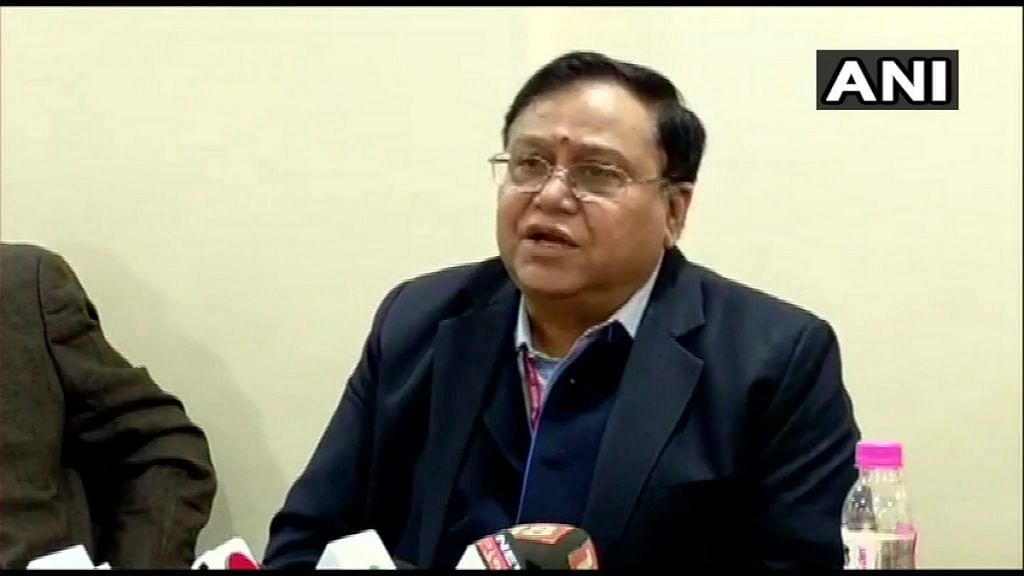New Delhi: NITI Aayog member V.K. Saraswat, whose remarks on the internet lockdown in Jammu and Kashmir have kicked up a storm, is one of the most high-profile and controversial former chiefs of the Defence Research and Development Organisation, a Padma Bhushan awardee, a key player behind the development of the Prithvi missile, and the chancellor of JNU.
The erstwhile state of J&K has been under an internet lockdown since August, when the Narendra Modi government scrapped Article 370 and bifurcated it into two union territories. But Saraswat was quoted as saying Saturday that suspension of internet services in the state did not have a “significant effect” on the economy because it was used to only watch “gandi filmein (dirty films)”.
While many slammed his statement for being insensitive, it isn’t the first controversy Saraswat has found himself embroiled in.
Earlier this month, when students and teachers at JNU were attacked by masked persons, allegedly in connection with the fee hike protests at the university, its chancellor Saraswat said in an interview: “When intellectuals react without understanding things, it’s a matter of concern.”
Saraswat was involved in a row last year too, when PM Modi announced the Anti-Satellite weapons test days after the Model Code of Conduct for the general elections came into force. The senior scientist said Manmohan Singh’s UPA government had not given a go-ahead for the mission due to “fear psychosis”, even though it had the wherewithal.
The politically-loaded statement was refuted as “factually inaccurate” by Saraswat’s own former colleagues at DRDO. They also criticised him for dragging the DRDO into a political slugfest.
Also read: Kashmir apex trade body condemns Saraswat’s ‘dirty films’ remark, demands his immediate removal
‘A seasoned scientist’
Though his recent statements have been alleged to have a political slant in favour of the Modi government, Saraswat’s colleagues in the NITI Aayog say his work has never reflected any bias.
“He is a very seasoned scientist… One remembers him for his absolute thoroughness,” said a former senior official in the NITI Aayog, who did not wish to be identified.
“He really goes into the heart of the matter, and has been a key person in all scientific and technological matters in the country, not just at the national level, but also the state level,” the official said.
“None of his work at NITI Aayog has reflected any political bias ever… But at the end of it, these are all political appointments, and ‘Member, NITI Aayog’ is a Minister of State rank, so one cannot expect complete political neutrality,” the official added.
Gave original ‘Make in India’ call
Saraswat’s career is stuffed with notable achievements. Armed with a PhD in combustion engineering from Osmania University, Saraswat started his career at the DRDO in 1972. From designing, developing and producing the Prithvi missile, Saraswat played a leading role in inducting India’s first surface-to-surface missile system into the armed forces.
Though Saraswat has worked with the defence sector, he has often locked horns with the Army on key issues. In 2012, years before the Modi government came to power and gave emphasis to ‘Make in India’ in the sector, Saraswat had thrown his weight behind indigenous technologies and equipment in defence.
“Services also must understand that while the temptation may be overwhelming to field proven, state-of-the-art imported systems, they too have a role to play in the country’s economic and industrial growth. No foreign system can be customised to completely address our long-term requirements,” he had said in the presence of then-Air Chief Marshal P.V. Naik, Admiral Nirmal Verma and Gen. V.K. Singh.
Saraswat was part of the team that India’s ‘missile man’ A.P.J. Abdul Kalam, later the President of India, had hand-picked to work on the Integrated Guided Missile Development Programme. Saraswat was awarded the Padma Shri in 1998 and the Padma Bhushan in 2013.
Also read: NASA is not the final word on space debris from A-SAT, says former DRDO chief Saraswat
Controversies at DRDO
In the same year that the UPA government awarded him the Padma Bhushan, it decided not to extend Saraswat’s tenure as DRDO chief after a secret report by the Comptroller and Auditor General, which found that “DRDO has been developing equipment which is either sub-standard or has extended deadlines and additional budgets”.
“Many of the projects have been sanctioned without the requisite government approval. Only 10 per cent of projects have come to the ministry for clearance. Corruption and nepotism exists in the upper echelons and there is an exodus of qualified scientists,” the report noted.
Subsequently, the Ministry of Defence took the unprecedented decision of imposing severe restriction on the DRDO chief’s financial powers.
A year after his retirement from the DRDO, Saraswat, along with D. Malakondaiah, director of the Defence Metallurgical Research Laboratory, were sentenced to three weeks’ simple imprisonment by the Madras High Court. The two were held guilty for contempt of court for not following the court’s April 2009 order related to re-employment of a clerk in a school run by a wing of the DRDO.
ThePrint tried to reach Sarawat through calls and text messages but was unable to do so till the time of publishing this report.
Also read: India lost at least $1.3 billion to internet shutdowns in 2019
